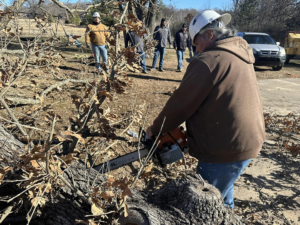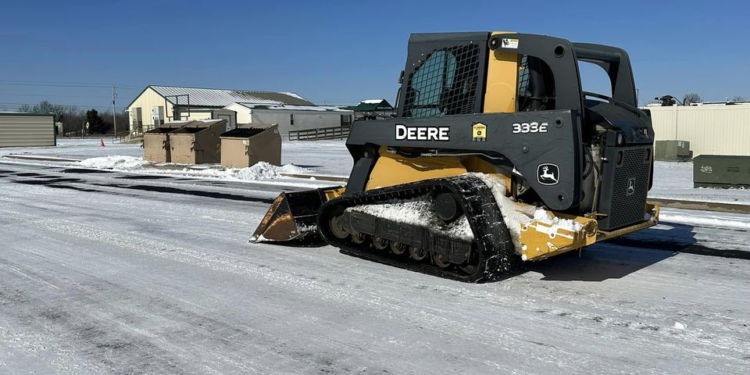OKMULGEE, Okla.- It’s becoming more kvsvppe (cold) with the winter season now in full swing. After a mix of snowfall made its way across the Mvskoke Reservation on Sunday, Jan 14., residents got a taste of what mother nature was capable of producing this winter season. As a result the reservation experienced subfreezing temperatures and some even experienced power outages in areas like Broken Arrow. Whether on the road or at home, precautions must be taken during cold snaps like these that present life-threatening conditions. Winter weather conditions can pose risks to those outdoors and indoors.
According to the Center for Disease Control and Prevention, “Winter storms are dangerous. They can bring cold temperatures, power failures, loss of communication services, and icy roads. This can make being outside dangerous, so you should limit your time outside. Although staying indoors as much as possible can help reduce the risk of car crashes and falls on the ice, you may also face hazards inside your home,”.
Before a winter storm hits, always make sure vehicles are up to date on maintenance. Keep a watchful eye out on weather forecasts before going out, and make sure proper food and supplies are handy at home and on the road.
Pets should be brought indoors if possible. If this is not a pragmatic option, it is important to make sure they have a warm shelter and water that is unfrozen.
The Muscogee (Creek) Nation’s Facebook page posted helpful tips on staying safe inside during the winter months. For using heat at home, it is important to keep flammable objects at least three feet away from heat sources like fireplaces and wood stoves. Heating equipment like chimneys can be maintained through professional inspections every year. Do not use gas stoves or ovens to heat a house. Freezers and refrigerators need to remain closed, and power generators need to be kept outside.
There are many signs to recognize different winter hazards and dangerous cold exposures. It is always a good idea to prepare for the worst winter weather situations possible, given the unpredictable nature of weather conditions in Oklahoma during this time of the year.
Home and Vehicle Preparation

The CDC recommends weather proofing homes by repairing roof leaks, cutting tree branches that can potentially fall after a storm, and installing both a smoke detector and a battery-operated carbon monoxide detector.
For senior citizens it is recommended that they own an easy-to-read thermometer. Elders are more susceptible to becoming cold faster than younger individuals. It is also recommended that elders have updated contact information to stay in touch with their support network. Adequate, bright lighting around the home is important to prevent falls. When there is ice or snow on the ground outside, proper fitting shoes with a sturdy underneath grip are important for traversing slick areas. For those using wheelchairs or walkers for mobility, it is recommended that the equipment is properly dried off after entering a home to prevent slips.
MCN’s Facebook page also provided low-cost tips for those who do not own a HVAC system. Closing the doors and vents in rooms that are not in use can preserve heat. Weather stripping, caulking or window insulation kits can help prevent heat from escaping through windows.
Power outages are a possibility during winter storms and can prevent homeowners from using electronic devices and appliances. In the event of a power outage throw away perishable food items that have been sitting for two or more hours in a refrigerator or freezer that is 40 degrees fahrenheit or above. For those that have refrigerated medications, it is important to have a back up plan to keep medicine at just the right temperature.
Drivers are advised to not travel through winter storms. However, if there are no other options, drivers are advised to keep an emergency kit handy in their vehicle in case they break down on the side of the road. Kits need to be inspected to make sure they do not contain expired items. A well-rounded emergency kit can include a flashlight, extra batteries, a portable smart device charger, tow chains or rope, warm clothing, water and snacks. It is also a good idea to keep a vehicle’s gas tank full or near full.
Cold exposures such as hyperthermia and frostbite pose a threat to those outdoors. Signs of hypothermia in adults include exhaustion, shivering and slurred speech. Signs of hypothermia in babies include bright red, cold skin and low energy.
To view more information about weather tips and cold exposure signs, follow the MCN Facebook page, The Muscogee Nation. To learn more information about weather preparation for this season, it can be found on the CDC’s website under natural disasters and severe weather.
For contact information on disaster and emergency situations, call 539-244-2775. For firewood and elderly services, call 918-732-7699.





